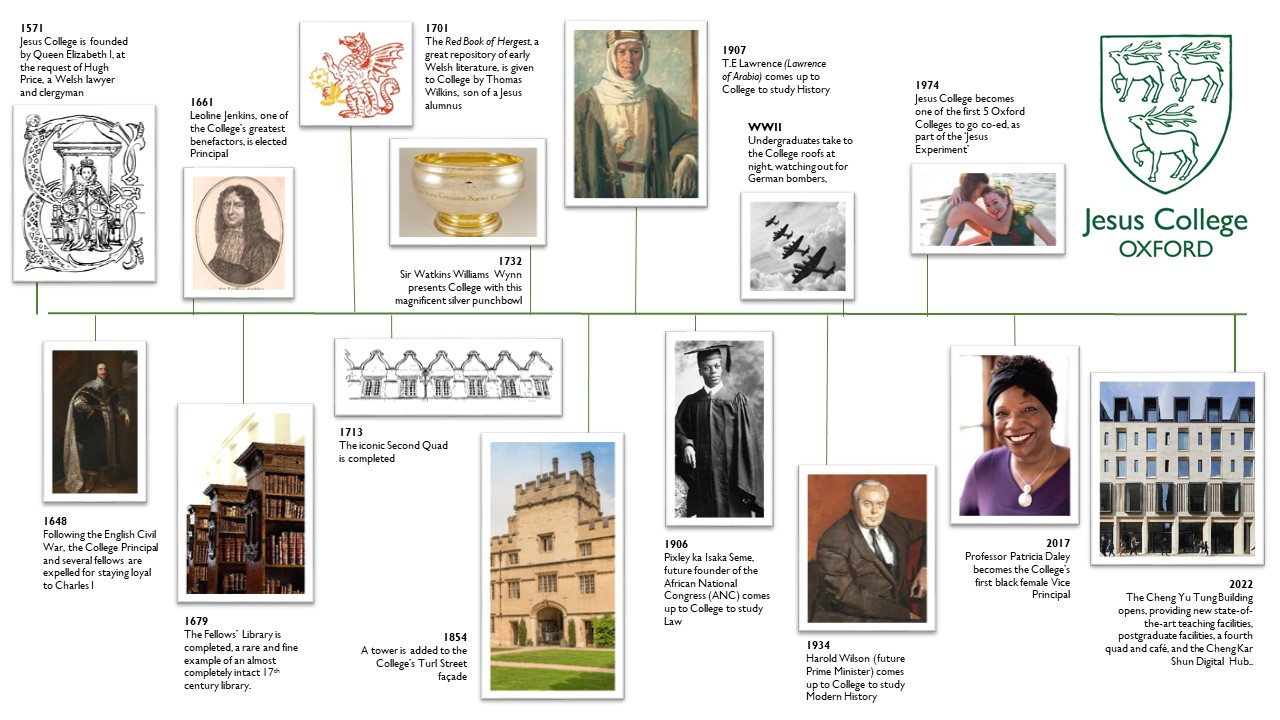Jesus College was founded in June 1571 by a group of Welshmen led by Hugh Price, a lawyer, clergyman and Treasurer of St. David’s Cathedral. In approving the new foundation however, Queen Elizabeth I appointed herself its Foundress, and Jesus became the first and only Oxford College to be founded during the monarch’s reign.
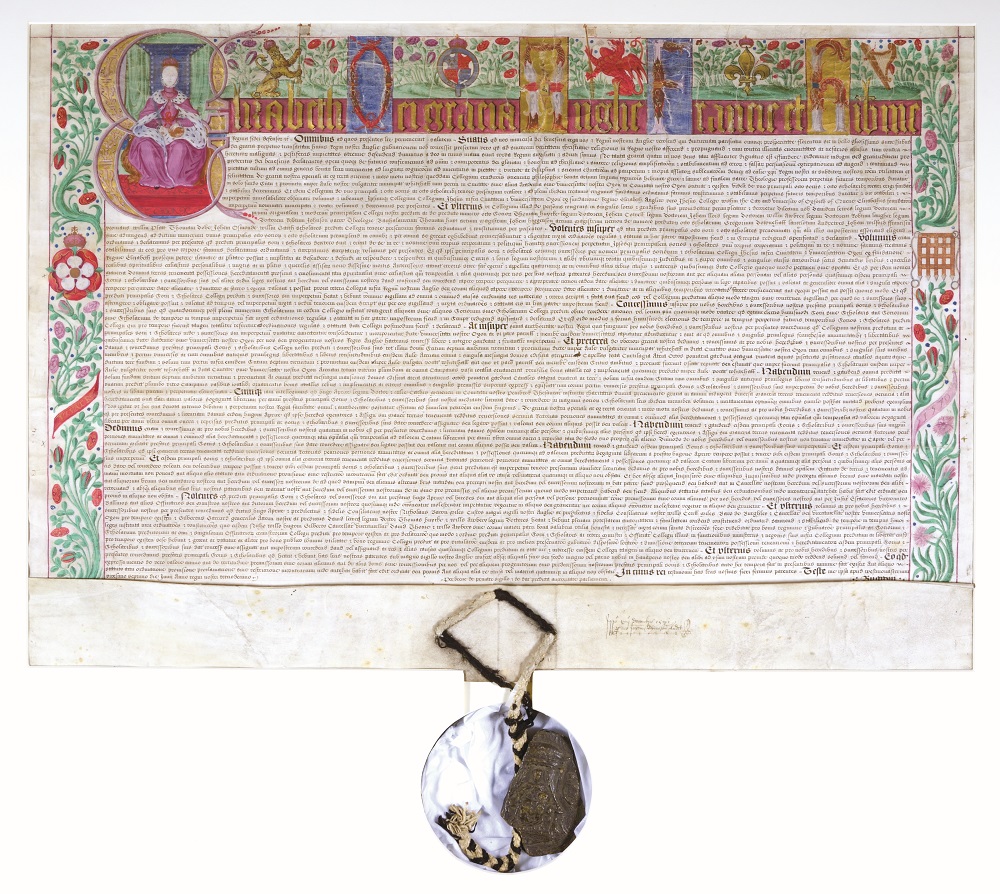
Jesus College Founding Charter of 1571
In its early decades, Jesus College was considered small and poor in comparison to other Oxford colleges. It was not until the 1610s that a succession of energetic Principals attracted donations to endow fellowships and scholarships, and erect buildings. Thanks to their efforts, the First Quadrangle was completed by the mid-1630s, replacing the medieval White Hall on the site, and work on the Second Quadrangle began in 1639. By now the College’s Welsh links were well established: almost all its fellowships and scholarships were open only to Welsh applicants.
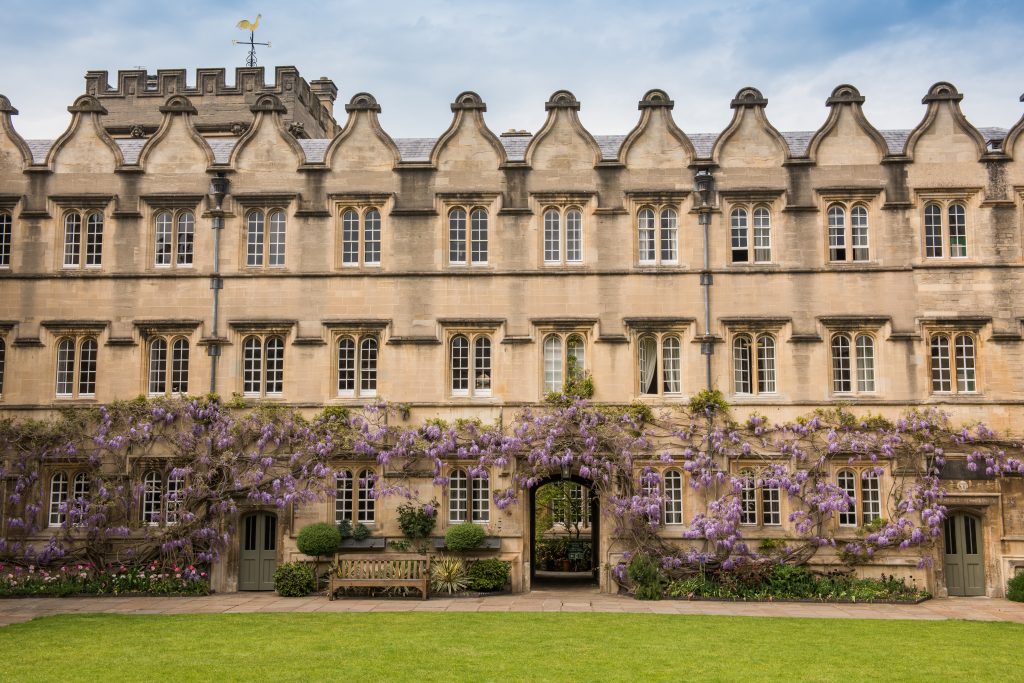
The building of the College’s Second Quadrangle began in 1639
The English Civil War affected Jesus College badly: the then Principal, Francis Mansell, and several Fellows were expelled, and the College’s finances were left in a bad state. In 1661, however, the College elected a new Principal, Sir Leoline Jenkins. Jenkins was a lawyer, diplomat and politician, who had studied at Oxford, and ascended to become Secretary of State to Charles II. On his death in 1685, Jenkins bequeathed his estate to Jesus College, giving it a financial security never known before. Jenkins is therefore considered the College’s second Founder.
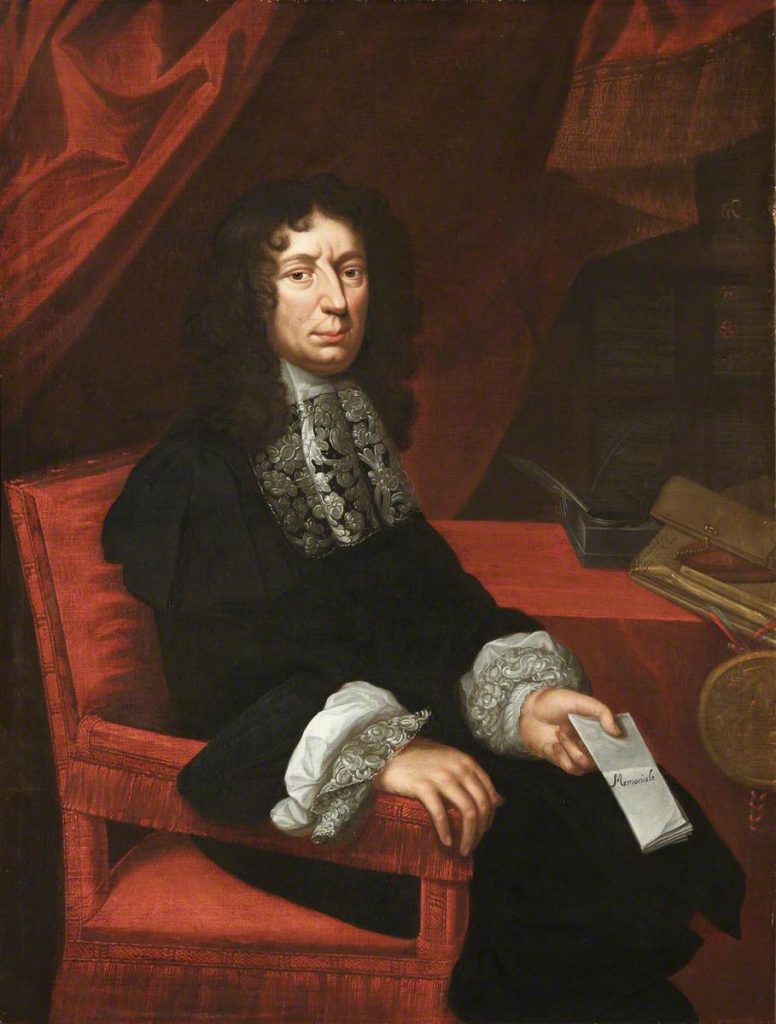
Sir Leoline Jenkins (1623-1685) by Hubert Tuer (copy of)
The Second Quadrangle was finally completed in 1713, the same year in which an Old Member, Edmund Meyricke, died, bequeathing estates to fund more Welsh scholarships and exhibitions. During the 18th and early 19th centuries, Jesus was never a famous College, but rather stayed true to its Welsh roots, educating a stream of young Welshmen in theological studies, many of whom returned to Wales after graduation to become parish priests. In the later 19th century, the proportion of Welsh fellowships and scholarships was reduced, but the Welsh tradition remained strong.
Sir John Rhŷs, Principal from 1895-1915 and one of the most important Celtic scholars of his day, is responsible for instigating the transformation of Jesus into the welcoming and outward-facing College it is today. Under his leadership, the College opened its doors to students from outside of Wales, and bridged new links with universities in Europe and the US. He spoke up for internationalism and female suffrage.
As the College grew in size, so it erected more buildings. The Third Quadrangle was finished in 1908, integrating a new science laboratory (now the Meyricke Library). The Old Members’ Building was opened in 1971 by the then HRH The Prince of Wales.
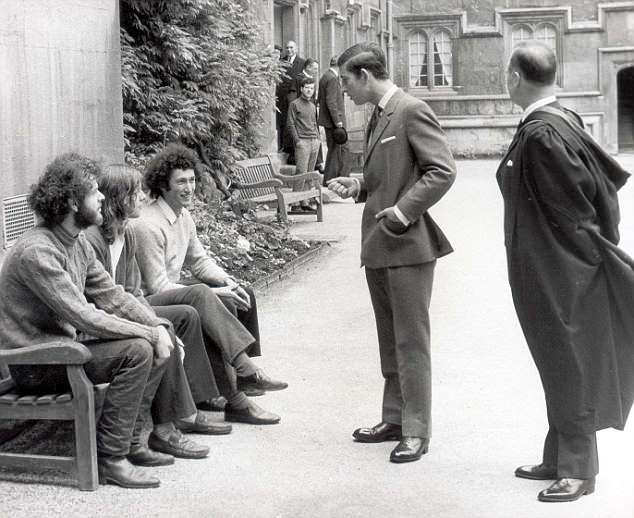
The Prince of Wales stops to talk with students seated on a bench in First Quad during his visit to Jesus College in 1971, where he opened the Old Members’ Building to mark the 400th anniversary of the College.
Elsewhere in Oxford, Stevens Close (off the Woodstock Road) was completed in 1976, thanks to a benefaction from an Old Member, Edwin Stevens, while Herbert Close grew up over several years next to the College’s playing fields in East Oxford.
The most important event in the later 20th century was the admission of women as students in 1974. Jesus is proud to be one of the first five Colleges in Oxford to become co-ed.
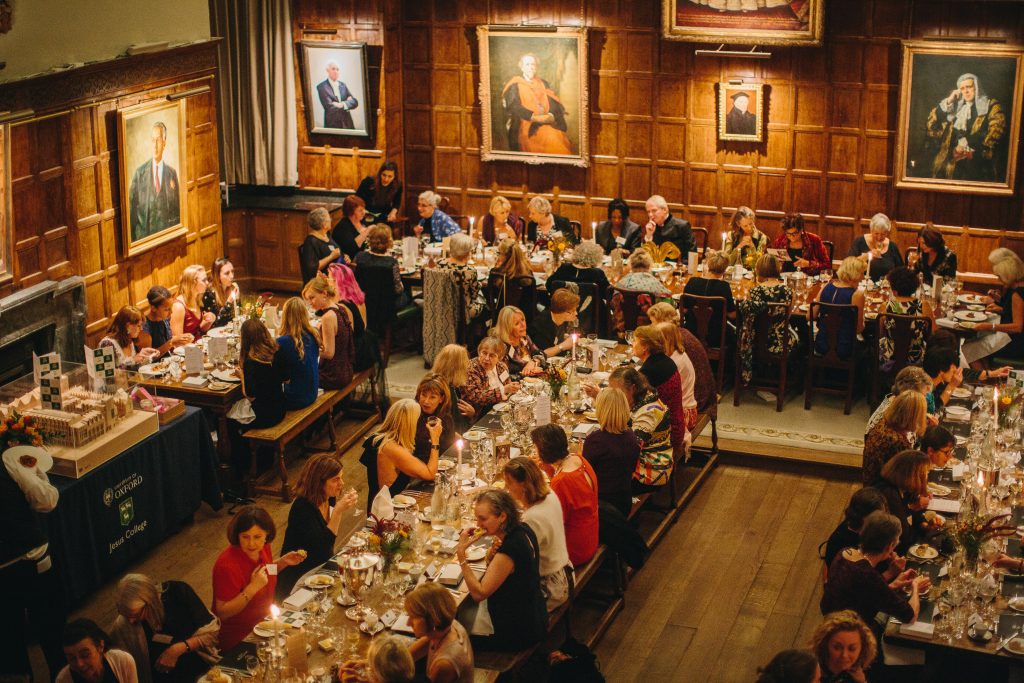
The first women of Jesus return to celebrate the 45th Anniversary of the college becoming co-educational.
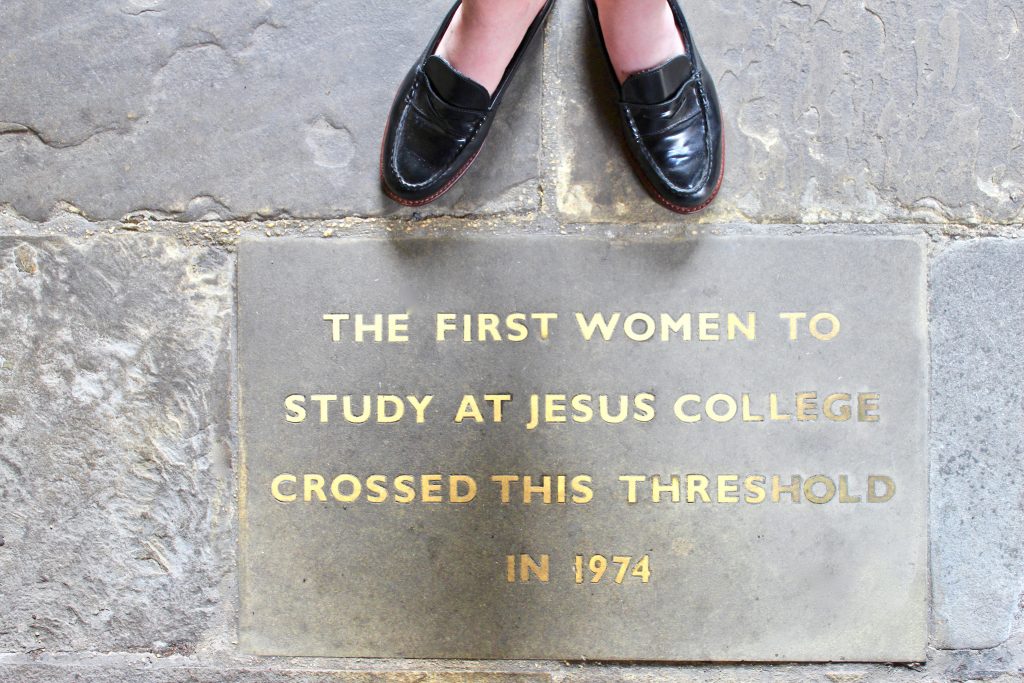
This flagstone was laid to celebrate the first women to study at Jesus College, in 1974
In 2021 the College celebrated its 450th anniversary with the completion of an important new architectural development on the corner of Cornmarket and Market Street. The Cheng Yu Tung Building provides state-of-the-art research and educational facilities, new student accommodation and a fourth quad.
By Dr Robin Darwall-Smith, Jesus College Archivist
There are three book-length histories of Jesus College:
E.G. Hardy, Jesus College (London: F.E. Robinson, 1899). The full text of this book may be found here.
J.N.L. Baker, Jesus College, Oxford, 1571-1971 (Oxford: Jesus College, 1971)
Felicity Heal (ed.), Jesus College Oxford of Queen Elizabethes Foundation: The First 450 Years (London: Profile, 2021). Copies of this book are available to purchase from Blackwells here.
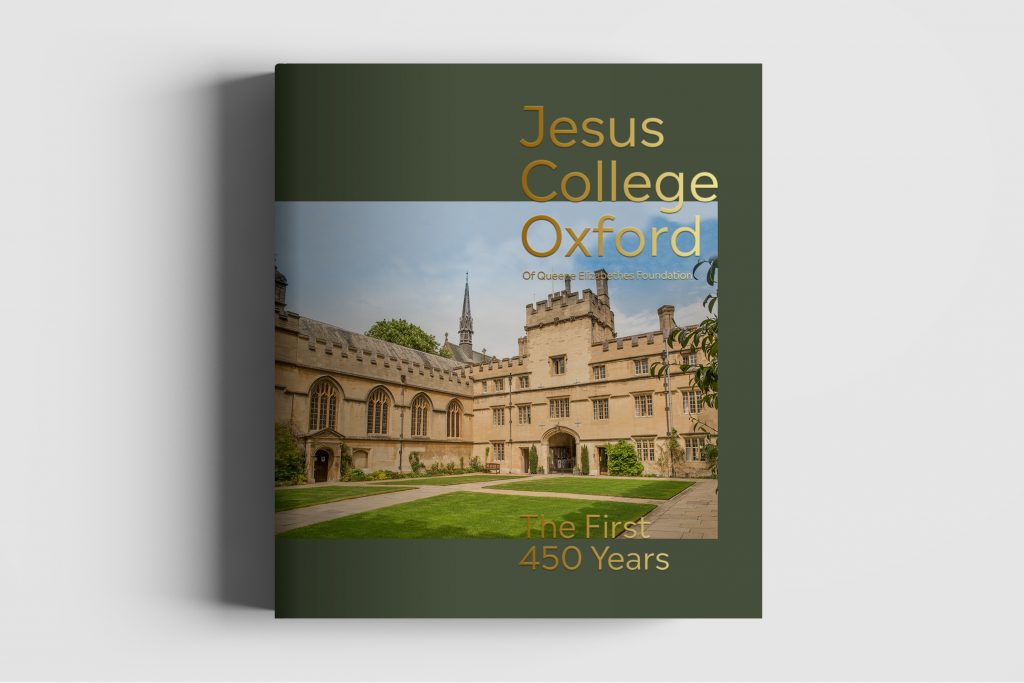
The illustrated history of Jesus college was published in 2021 to mark its 450th Anniversary
There are two other important articles on the history of the College, both available to read online:
J.N.L. Baker, ‘Jesus College‘, pages 264-279 in H.E. Salter & M.D. Lobel (editors), A History of the County of Oxford, Volume 3: The University of Oxford (London: Oxford University Press for the Institute of Historical Research, 1954)
Brigid Allen, ‘The Early History of Jesus College, Oxford, 1571-1603‘ Oxoniensia LXIII (1998), pages 105-124.
The annual Jesus College Record (previously entitled the Jesus College Magazine and Dragon) contains many articles on various aspects of college history.
The Jesus Authors collection in the Meyricke Library consists of books by and about Fellows, Old Members, and others associated with Jesus College. It is catalogued on SOLO and available in the Periodicals Room for current College members to borrow from. In particular, the College also possesses a large number of books by and about T. E. Lawrence. For further information about these, and other books in the Jesus Authors collection, please contact our Librarian at librarian@jesus.ox.ac.uk.
For further information about the history of Oxford University in general, see:
The History of the University of Oxford, general editor Trevor Aston (8 volumes, Oxford: OUP, 1984-2000).
W. B. Brockliss, The University of Oxford: A History (Oxford: OUP, 2016).
Here are some links to other websites about archives which might be useful to your research:
This website contains details of archives held by other Oxford Colleges, and how to contact them, as well as much extra information about the history of Oxford.
Oxford University Archives This is the website of the central archives of the University of Oxford.
Special Collections of the Bodleian Library
If you are interested in Jesus College, Cambridge, then its archive website may be found here.
